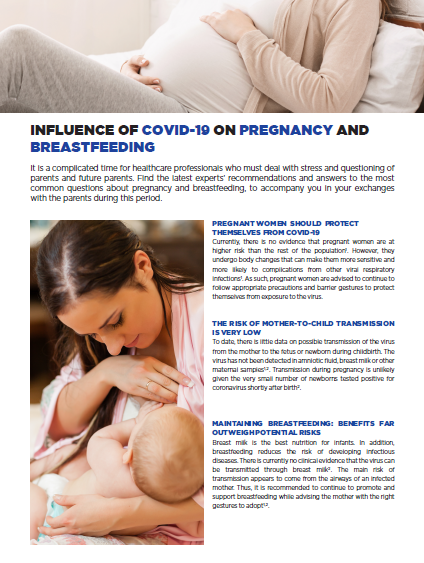It is a complicated time for healthcare professionals who must deal with stress and questioning of parents and future parents. Find the latest experts’ recommendations and answers to the most common questions about pregnancy and breastfeeding, to accompany you in your exchanges with the parents during this period.
PREGNANT WOMEN SHOULD PROTECT THEMSELVES FROM COVID-19
Currently, there is no evidence that pregnant women are at higher risk than the rest of the population1. However, they undergo body changes that can make them more sensitive and more likely to complications from other viral respiratory infections1. As such, pregnant women are advised to continue to follow appropriate precautions and barrier gestures to protect themselves from exposure to the virus.
THE RISK OF MOTHER-TO-CHILD TRANSMISSION IS VERY LOW
To date, there is little data on possible transmission of the virus from the mother to the fetus or newborn during childbirth. The virus has not been detected in amniotic fluid, breast milk or other maternal samples1,2. Transmission during pregnancy is unlikely given the very small number of newborns tested positive for coronavirus shortly after birth2.
MAINTAINING BREASTFEEDING: BENEFITS FAR OUTWEIGH POTENTIAL RISKS
Breast milk is the best nutrition for infants. In addition, breastfeeding reduces the risk of developing infectious diseases. There is currently no clinical evidence that the virus can be transmitted through breast milk2. The main risk of transmission appears to come from the airways of an infected mother. Thus, it is recommended to continue to promote and support breastfeeding while advising the mother with the right gestures to adopt1,2.
ESSENTIAL TIPS TO SHARE WITH PARENTS AND PREGNANT WOMEN:
| PREGNANCY Tips to protect the mother and newborn | BREASTFEEDING Precautions to consider |
|---|---|
| To prevent risks of contamination, it is recommended that pregnant women1,2: • Wash their hands regularly with soap or with hydroalcoholic gel. • Practice social distancing. • Avoid touching their eyes, nose and mouth. • Practice good respiratory hygiene. • Adopt good personal and domestic hygiene practices. • Avoid sick people. | If a mother wishes to breastfeed, she should take precautions to limit the spread of COVID-19 to her infant1,2: • Practice respiratory hygiene during breastfeeding and avoid coughing or sneezing on the infant (a mask can be used, depending on local recommendations). • Wash her hands before touching the infant, breast pump or baby bottles. • Clean and disinfect surfaces regularly. • When the mother uses a breast pump, clean it after each use, as recommended by the manufacturer. • If the mother is sick, she can ask a healthy person to give her breast milk instead of hers. • During breastfeeding, the mother should stay well hydrated, eat a balanced diet and should take some rest throughout the day. |

Publication : Influence of COVID-19 on pregnancy and breastfeeding
References
- World Health Organisation : https://www.who.int news-room/q-a-detail/q-a-on-covid-19-pregnancy-childbirth-and-breastfeeding
- Centers for Disease Control and Prevention : https://www.cdc.gov/breastfeeding/breastfeeding-special-circumstances/maternal-or-infant-illnesses/covid-19-and-breastfeeding.html
BA20-368
